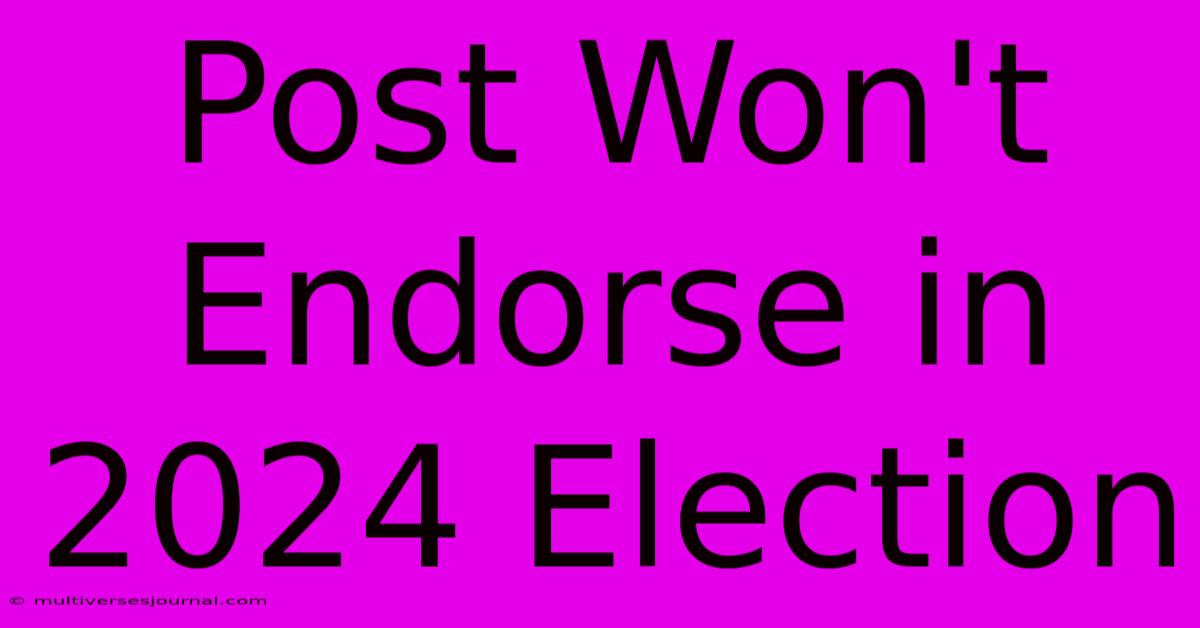Post Won't Endorse In 2024 Election

Discover more detailed and exciting information on our website. Click the link below to start your adventure: Visit Best Website multiversesjournal.com. Don't miss out!
Discover more detailed and exciting information on our website. Click the link below to start your adventure: Visit Best Website mr.cleine.com. Don't miss out!
Table of Contents
Post Won't Endorse in 2024 Election: Focus Shifts to Community Engagement
The 2024 election is fast approaching, and while many anticipate a flurry of political endorsements from influential figures, one notable name has announced its decision to stay out of the fray: Post.
In a recent statement, the social media platform declared its intention to not endorse any candidate in the upcoming election. This decision, while surprising to some, reflects a growing trend among tech giants to de-emphasize political involvement in favor of focusing on community engagement and platform integrity.
Why Post Is Taking a Step Back
Several factors have likely contributed to Post's decision to remain neutral:
- Avoiding Controversy: With an increasingly polarized political landscape, endorsements from major platforms can easily fuel backlash and accusations of bias. By staying neutral, Post aims to avoid becoming entangled in political disputes and maintain its position as a neutral space for diverse voices.
- Focus on Platform Stability: The past few years have seen significant challenges for social media platforms in terms of misinformation, hate speech, and election interference. Post likely believes that its resources are better spent on strengthening platform security and combating these issues rather than engaging in direct political activism.
- Empowering Users: Post's commitment to community engagement emphasizes empowering users to participate in political discourse without undue influence from the platform itself. This approach allows for a more organic and diverse range of perspectives to be shared on the platform.
What This Means for Users
While Post won't be offering official endorsements, its decision to prioritize user experience and platform integrity can still have a significant impact on the 2024 election:
- Neutral Ground for Dialogue: The absence of a platform-driven political agenda can encourage more open and nuanced discussions on the platform. Users will have a greater opportunity to engage with diverse perspectives and form their own opinions without being swayed by platform bias.
- Increased Transparency: By not endorsing candidates, Post can focus more on transparency in its content moderation practices. This can foster greater trust among users who may be concerned about platform manipulation or censorship.
- Focus on Fact-Checking and Information Accuracy: Post's commitment to combatting misinformation will be crucial in the upcoming election. The platform can leverage its resources to ensure users have access to accurate information and are able to discern credible sources.
The Future of Platform Engagement
Post's decision to take a step back from political endorsements signals a potential shift in the way tech platforms engage with political discourse. While some may view this as a retreat, it could be a necessary step towards establishing a more balanced and responsible approach to platform governance. As the 2024 election unfolds, it will be interesting to see how other social media platforms respond to Post's lead and how this evolving approach impacts the overall political landscape.
This decision by Post could serve as a model for other social media giants, fostering a healthier, more nuanced, and less politically charged environment for online communities. Only time will tell how this decision will shape the future of online political discourse, but one thing is clear: the conversation is evolving, and platforms are playing an increasingly complex role in it.

Thank you for visiting our website wich cover about Post Won't Endorse In 2024 Election. We hope the information provided has been useful to you. Feel free to contact us if you have any questions or need further assistance. See you next time and dont miss to bookmark.
Thank you for visiting our website wich cover about Post Won't Endorse In 2024 Election. We hope the information provided has been useful to you. Feel free to contact us if you have any questions or need further assistance. See you next time and dont miss to bookmark.
Featured Posts
-
Hip Hop Legend Dj Clark Kent Dies
Oct 26, 2024
-
Trumps Upcoming Rogan Interview Details
Oct 26, 2024
-
Karaj Nuclear Plant Fire Iran Reports Incident
Oct 26, 2024
-
Atlanta Wins Opener Takes Series Lead
Oct 26, 2024
-
Kelsea Ballerinis Patterns Reflect Growth
Oct 26, 2024
